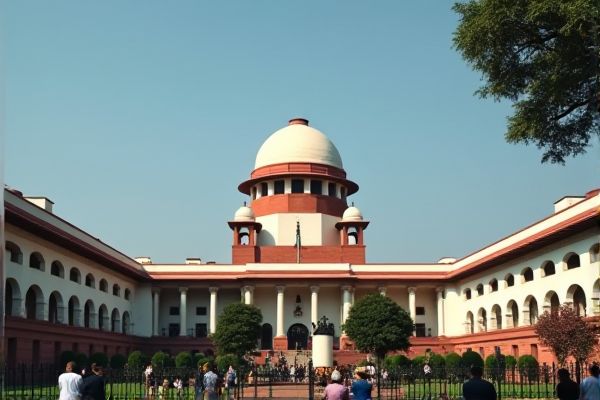
The representation of Muslims in government jobs in India has been a topic of discussion and analysis. According to various studies and government reports, Muslims constitute approximately 14% of the Indian population but are significantly underrepresented in public sector employment. Data from the 2021 Census and different commissions indicate that the percentage of Muslims in government jobs hovers around 3% to 5%, highlighting disparities in employment opportunities. This underrepresentation raises concerns about inclusivity and equality in public service, influencing ongoing debates on affirmative action and policy reforms.
Job Description
In India, Muslims represent approximately 14% of the total population, but their representation in government jobs is notably lower, around 4-5%. Various factors contribute to this disparity, including socioeconomic status, educational opportunities, and systemic barriers within the recruitment process. You can explore programs and initiatives aimed at increasing diversity and inclusivity in public sector employment, as these are designed to create equitable chances for all communities. Understanding the dynamics of this representation can empower your approach to addressing and supporting a more inclusive workforce in government roles.
Requirement
In India, the percentage of Muslims in government jobs is a subject of active discussion, particularly in relation to their representation based on employment policies. Job requirements for government positions typically include educational qualifications, age limits, and sometimes, specific skills or experiences that align with the role. Efforts to improve diversity and inclusion have prompted various initiatives aimed at ensuring equitable opportunities for all communities, including Muslims. Understanding these dynamics can help you navigate the landscape of public sector employment and advocate for fair representation.
Salary and Perks Expected
In India, the representation of Muslims in government jobs is a topic of increasing interest, especially considering their overall population percentage. Data indicates that Muslims constitute around 14-15% of the Indian population; however, their presence in government roles often falls short of this percentage. Salaries for government positions can vary widely, typically ranging from INR 25,000 to INR 100,000 per month, depending on the level of the job and seniority. Along with competitive salaries, many government jobs offer attractive perks, such as health benefits, job security, and pension schemes, making them desirable to various communities, including Muslims.
Similar Job Names
- Assistant Commissioner
- Deputy Collector
- Police Inspector
- Sub-Inspector
- Teacher (Government Schools)
- Medical Officer
- Revenue Officer
- Clerk
- Public Relation Officer
- Accountant
- Data Entry Operator
- Postal Service Worker
- Social Welfare Officer
- Customs Officer
- Forest Range Officer
- Civil Engineer (Government Projects)
- Labor Officer
- Supervisor
- Enumerator
- Research Officer
Job Expectation Concept
In India, the job expectation for Muslims in government jobs reflects the demographic diversity of the nation. Approximately 14% of the Indian population identifies as Muslim, yet representation in government positions often falls short of this percentage. Factors such as educational access, socio-economic status, and regional disparities influence the recruitment of Muslims into these roles. Addressing these barriers can lead to a more equitable workforce that better reflects the nation's diversity and provides you with insights into the broader implications for society.
Career Advantage and Weakness
In India, the representation of Muslims in government jobs reflects both career advantages and challenges. Many government initiatives aim to enhance the participation of minority communities, offering reservations and special schemes that can provide you with opportunities. However, the percentage of Muslims in these positions often remains lower compared to their population share, indicating systemic barriers that need addressing. Understanding these dynamics can help you navigate the job landscape more effectively and advocate for more inclusive policies.
Important Thing Must Know
In India, the percentage of Muslims in government jobs has been a topic of ongoing discussion and analysis. Various studies indicate that the representation of Muslims in public sector employment is significantly lower than their demographic share in the population. Current estimates suggest that about 14% of India's population identifies as Muslim, yet their presence in government roles often hovers around 5% to 7%. This disparity can affect the inclusivity of governance and public service, making it crucial for policymakers to consider measures that promote equal opportunities. Addressing this imbalance can enhance community trust and improve representation in decision-making processes.
Alternative Career Options
India's government job sector offers diverse opportunities for individuals from various backgrounds, including Muslims, who constitute around 14% of the population. While many seek positions in traditional roles, exploring alternative career options within public service can be equally rewarding. Fields such as education, healthcare, and environmental management are increasingly accessible and can align with your personal strengths and interests. By considering these options, you enhance your chances of contributing positively to society while building a fulfilling career path.
Companies List
- Central government ministries and departments
- Public Sector Undertakings (PSUs)
- State government departments
- Indian Railways
- Ministry of Minority Affairs
- National Minorities Development & Finance Corporation
- Banks and financial institutions
- Indian Armed Forces
- Municipal and local government bodies
- Educational institutions run by the government
List of Ideal City
Cities in India with a significant Muslim population offering favorable conditions for government jobs include Hyderabad, Jaipur, and Lucknow. Hyderabad, known for its historical and cultural significance, has a robust job market with various state and central government opportunities. Jaipur, the capital of Rajasthan, not only boasts a vibrant economy but also promotes reservation policies benefiting minorities. Lucknow, rich in heritage, has been focusing on enhancing employment prospects for the Muslim community through skill development initiatives and targeted recruitment drives.
 jobs-india.net
jobs-india.net